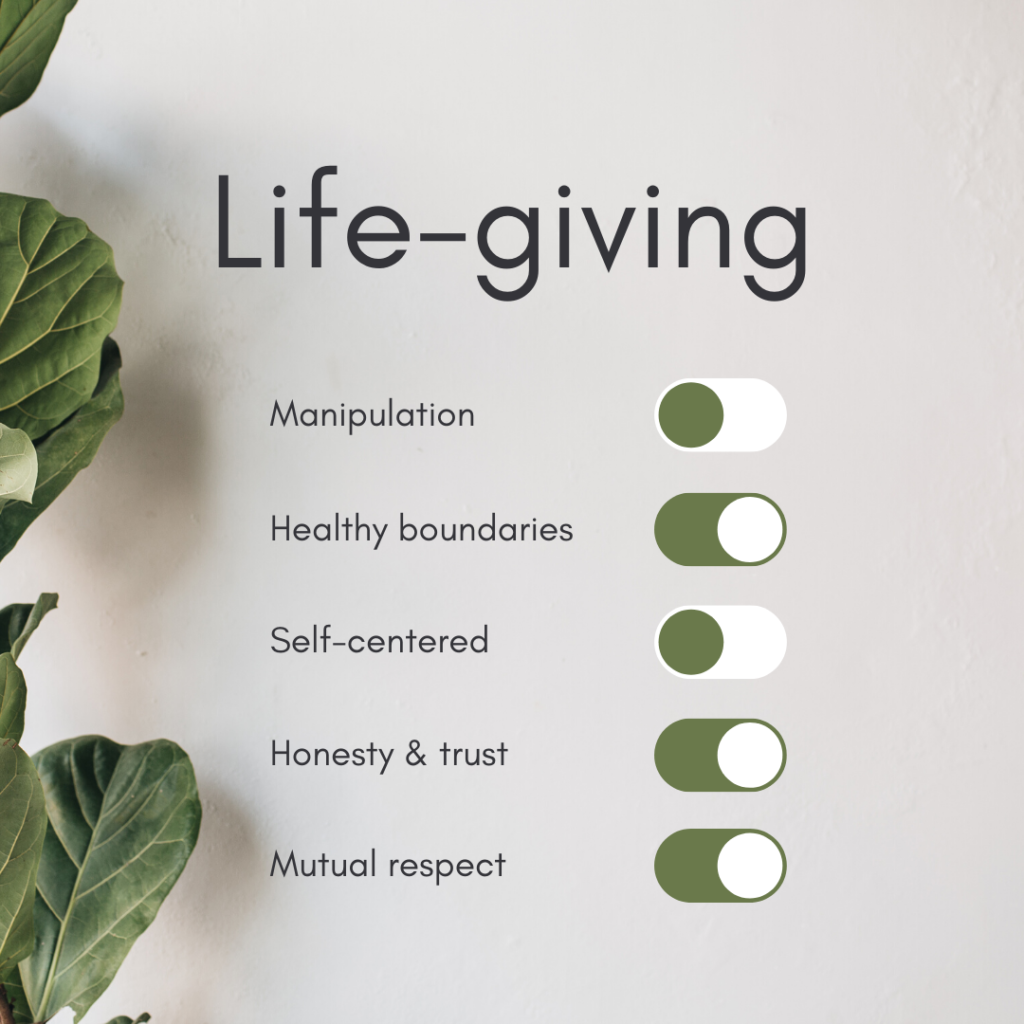What is the difference between life-giving and life-taking relationships? Why does it matter and what should we do?
If you’ve ever been hurt by a close friend, you know how that pain can linger. Even if it wasn’t a blatant betrayal or a personal attack, it can still leave you wounded. Sometimes, those moments leave scars on our hearts that can affect our willingness to trust again.

Mistakes and misunderstandings are going to happen in any relationship. We must not begin to expect that our friendships will be free of conflict, but we do need to recognize whether the good outweighs the bad.
We define life-giving relationships as those connections that deposit more value than they withdraw. They are authentic, which will be messy sometimes, and they are mutually beneficial.
A life-giving relationship will be marked by a handful of key characteristics:
- Mutual respect and appreciation
- “Calling up” instead of “calling out”
- Healthy boundaries and expectations
- Honesty and acceptance
- Apology and forgiveness
- Loyalty and trust
This is not an exhaustive list, but these are key components that will be part of any life-giving relationship. Where these characteristics are in place, good things grow, and hard things can be overcome.
Unfortunately, not all relationships are life-giving. In fact, many seem to be more trouble than they’re worth. Everyone must work to define what limits they are willing to set regarding pain in their relationships. Every day, you have an opportunity to teach those around you how to treat you, based on what you accept and what you reject.
In cases of abuse, you did not and do not have a responsibility for others’ mistreatment of you. We’re sorry if this is a part of your story. We want to support you and would love to help assist you in getting the proper treatment and recovery you need.

We are often hurt the most by people we are closest to. Some of the worst relational pain happens when we’ve been hurt by a friend. These can be crisis level situations for us that leave us wounded and erode trust which can lead to withdrawal or isolation.
When we’ve been hurt by a friend, we may find it hard to let go. In a life-giving relationship, these moments are met with courage, honesty, compassion, and forgiveness. But in a life-taking relationship, these moments may be just part of an all too normal routine.
Let’s take a look at what key characteristics make up a life-taking relationship:
- One-sided and selfish
- Critical or judgmental
- Jealousy or possessiveness
- Lying and manipulation
- Seldom takes responsibility or blame shifting
- Easily angered or abusive
When we continually get hurt by a friend, we may begin to make excuses for them or convince ourselves that we are the problem. In a life-taking relationship, your “friend” will let you take the blame and manipulate the situation to work out in their favor. They may even try to separate you from other healthier relationships to ensure that you stay clouded by their manipulation. Sometimes, the toxic “friend” will act like you are overreacting and want to just move on, instead of truly listening to your hurt and trying to make it right.
Remember, just because some of these things have happened once or twice, doesn’t automatically mean the relationship is life-taking or toxic. Mistakes happen, but if you notice a chronic pattern of behavior that looks like these issues, you may need to consider getting away from that relationship.
One dysfunctional or even toxic relationship can really derail you and create pain or chaos in your life.
Be mindful that you are worth more than that and deserve to be lifted up instead of cut down. Don’t allow another person to determine what you are allowed to accept from a relationship. Seek out those that love you and ask them to help you set healthy boundaries and expectations.

How we manage the relationships in our lives will often lead to happiness and success or hurt and sadness. Whoever you consistently surround yourself with will surely influence you. Ask yourself, “Are the people in my circle really in my corner?”
Our goal needs to be to surround ourselves with people who bring out the best in us and challenge us to continue to grow. Cultivating and protecting life-giving relationships takes two and it starts with you. Be kind to yourself.

